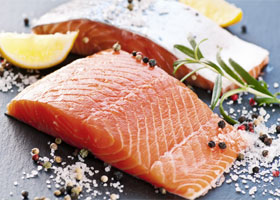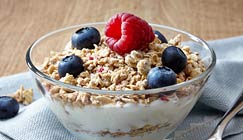We all need a little help to lift our moods sometimes – so here’s our suggestions for natural mood-boosting alternatives.
1. Vitamin D
With shorter daylight hours and less opportunity to feel the sun on our skin during the winter months, vitamin D levels often plummet along with the temperature. Vitamin D is a critical nutrient for balancing our moods, so it’s vital to top up your intake.
You can ask your GP to check your levels with a simple test and if you find out you are running low, a vitamin D supplement can help – look for D3 (cholecalciferol), as this is the active form naturally produced by the skin in response to sunlight.
2. Omega 3 Fats
 These clever fats are essential for many different aspects of good health, yet commonly deficient in our diet. Research now shows that the amount and type of fat you consume has a profound effect on how you think and feel. (Interestingly, countries with high intakes of fish often have low levels of depression.)
These clever fats are essential for many different aspects of good health, yet commonly deficient in our diet. Research now shows that the amount and type of fat you consume has a profound effect on how you think and feel. (Interestingly, countries with high intakes of fish often have low levels of depression.)
Choose oily fish including salmon, mackerel, anchovies, sardines and fresh tuna. If you don’t like fish (or the smell and preparation of it), go for a high strength EPA/DHA omega 3 supplement that has been shown to be both pure and stable. Poorer quality oils may do you more harm than good so it’s definitely worth investing in the best quality you can afford.
3. Balance Your Blood Sugar
A high intake of refined and processed foods, sugary drinks and snacks, alcohol and caffeinated drinks will result in out-of-balance blood sugar levels – often accompanied by rollercoaster mood swings and sugar cravings.
Get your day off to a good start with some slow-release carbohydrates (brown wholegrains) which take longer to digest, and are a healthy source of lasting energy to support and balance moods.
4. Proteins & Carbohydrates
 The key to managing blood sugar levels centres on eating a combination of carbohydrates with protein at every meal and snack. For example, an apple is nutritious, yet add a handful of nuts and seeds and it instantly becomes more complex.
The key to managing blood sugar levels centres on eating a combination of carbohydrates with protein at every meal and snack. For example, an apple is nutritious, yet add a handful of nuts and seeds and it instantly becomes more complex.
Swap those sugary pastries at breakfast for granola with yoghurt and poached eggs on rye toast. Eat regular, complex meals and snacks to support and naturally balance your mood.
5. Tryptophan
Our moods and energy levels are influenced by neurotransmitters; a group of brain chemicals made from protein. Tryptophan is the precursor to serotonin – the body’s ‘feel good’ neurotransmitter needed for happy moods, sleep and appetite control.
Research suggests that by consuming foods rich in tryptophan including cottage cheese, turkey, chicken, eggs, milk, almonds, soybeans and salmon, you can influence levels of serotonin made in the brain.
Other important vitamins and minerals to help us shake off that winter gloom include:
* Folic Acid
Broccoli, Spinach, Asparagus, Peas, Chickpeas, Brown Rice & Fortified breakfast cereals
* Vitamin B6
Poultry, Pork, Fish, Bread, Wholegrains, Eggs, Vegetables, Peanuts, Milk
* Vitamin C
Oranges, Kiwi, Broccoli, Peppers, Apples, Tomatoes, Squash
* Zinc
Meat, Shellfish, Milk, Cheese, Bread, Wheatgerm

